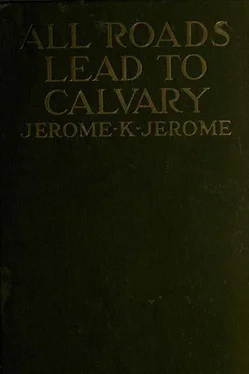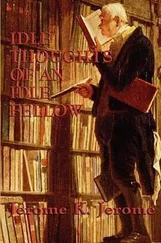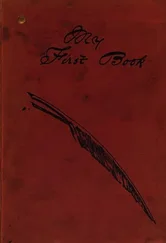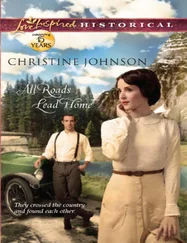Jerome Jerome - All Roads Lead to Calvary
Здесь есть возможность читать онлайн «Jerome Jerome - All Roads Lead to Calvary» весь текст электронной книги совершенно бесплатно (целиком полную версию без сокращений). В некоторых случаях можно слушать аудио, скачать через торрент в формате fb2 и присутствует краткое содержание. Город: London, Год выпуска: 1919, Издательство: Hutchinson & Co., Жанр: Классическая проза, на английском языке. Описание произведения, (предисловие) а так же отзывы посетителей доступны на портале библиотеки ЛибКат.
- Название:All Roads Lead to Calvary
- Автор:
- Издательство:Hutchinson & Co.
- Жанр:
- Год:1919
- Город:London
- ISBN:нет данных
- Рейтинг книги:3 / 5. Голосов: 1
-
Избранное:Добавить в избранное
- Отзывы:
-
Ваша оценка:
- 60
- 1
- 2
- 3
- 4
- 5
All Roads Lead to Calvary: краткое содержание, описание и аннотация
Предлагаем к чтению аннотацию, описание, краткое содержание или предисловие (зависит от того, что написал сам автор книги «All Roads Lead to Calvary»). Если вы не нашли необходимую информацию о книге — напишите в комментариях, мы постараемся отыскать её.
All Roads Lead to Calvary — читать онлайн бесплатно полную книгу (весь текст) целиком
Ниже представлен текст книги, разбитый по страницам. Система сохранения места последней прочитанной страницы, позволяет с удобством читать онлайн бесплатно книгу «All Roads Lead to Calvary», без необходимости каждый раз заново искать на чём Вы остановились. Поставьте закладку, и сможете в любой момент перейти на страницу, на которой закончили чтение.
Интервал:
Закладка:
She patted Joan’s hand and spoke gravely. “That is right, dear. That is youth’s métier ; to take the banner from our failing hands, bear it still a little onward.” Her small gloved hand closed on Joan’s with a pressure that made Joan wince.
“And you must not despair,” she continued; “because in the end it will seem to you that you have failed. It is the fallen that win the victories.”
She released Joan’s hand abruptly. “Come and see me to-morrow morning at my office,” she said. “We will fix up something that shall be serviceable to us both.”
Madge flashed Joan a look. She considered Joan’s position already secured. Mrs. Denton was the doyen of women journalists. She edited a monthly review and was leader writer of one of the most important dailies, besides being the controlling spirit of various social movements. Anyone she “took up” would be assured of steady work. The pay might not be able to compete with the prices paid for more popular journalism, but it would afford a foundation, and give to Joan that opportunity for influence which was her main ambition.
Joan expressed her thanks. She would like to have had more talk with the stern old lady, but was prevented by the entrance of two new comers. The first was Miss Lavery, a handsome, loud-toned young woman. She ran a nursing paper, but her chief interest was in the woman’s suffrage question, just then coming rapidly to the front. She had heard Joan speak at Cambridge and was eager to secure her adherence, being wishful to surround herself with a group of young and good-looking women who should take the movement out of the hands of the “frumps,” as she termed them. Her doubt was whether Joan would prove sufficiently tractable. She intended to offer her remunerative work upon the Nursing News without saying anything about the real motive behind, trusting to gratitude to make her task the easier.
The second was a clumsy-looking, overdressed woman whom Miss Lavery introduced as “Mrs. Phillips, a very dear friend of mine, who is going to be helpful to us all,” adding in a hurried aside to Madge, “I simply had to bring her. Will explain to you another time.” An apology certainly seemed to be needed. The woman was absurdly out of her place. She stood there panting and slightly perspiring. She was short and fat, with dyed hair. As a girl she had possibly been pretty in a dimpled, giggling sort of way. Joan judged her, in spite of her complexion, to be about forty.
Joan wondered if she could be the wife of the Member of Parliament who occupied the rooms below her in Cowley Street. His name, so the landlady had told her, was Phillips. She put the suggestion in a whisper to Flossie.
“Quite likely,” thought Flossie; “just the type that sort of man does marry. A barmaid, I expect.”
Others continued to arrive until altogether there must have been about a dozen women present. One of them turned out to be an old schoolfellow of Joan’s and two had been with her at Girton. Madge had selected those who she knew would be sympathetic, and all promised help: those who could not give it direct undertaking to provide introductions and recommendations, though some of them were frankly doubtful of journalism affording Joan anything more than the means — not always, too honest — of earning a living.
“I started out to preach the gospel: all that sort of thing,” drawled a Miss Simmonds from beneath a hat that, if she had paid for it, would have cost her five guineas. “Now my chief purpose in life is to tickle silly women into spending twice as much upon their clothes as their husbands can afford, bamboozling them into buying any old thing that our Advertising Manager instructs me to boom.”
“They talk about the editor’s opinions,” struck in a fiery little woman who was busy flinging crumbs out of the window to a crowd of noisy sparrows. “It’s the Advertiser edits half the papers. Write anything that three of them object to, and your proprietor tells you to change your convictions or go. Most of us change.” She jerked down the window with a slam.
“It’s the syndicates that have done it,” was a Mrs. Elliot’s opinion. She wrote “Society Notes” for a Labour weekly. “When one man owned a paper he wanted it to express his views. A company is only out for profit. Your modern newspaper is just a shop. It’s only purpose is to attract customers. Look at the Methodist Herald , owned by the same syndicate of Jews that runs the Racing News . They work it as far as possible with the same staff.”
“We’re a pack of hirelings,” asserted the fiery little woman. “Our pens are for sale to the highest bidder. I had a letter from Jocelyn only two days ago. He was one of the original staff of the Socialist . He writes me that he has gone as leader writer to a Conservative paper at twice his former salary. Expected me to congratulate him.”
“One of these days somebody will start a Society for the Reformation of the Press,” thought Flossie. “I wonder how the papers will take it?”
“Much as Rome took Savonarola,” thought Madge.
Mrs. Denton had risen.
“They are right to a great extent,” she said to Joan. “But not all the temple has been given over to the hucksters. You shall place your preaching stool in some quiet corner, where the passing feet shall pause awhile to listen.”
Her going was the signal for the breaking up of the party. In a short time Joan and Madge found themselves left with only Flossie.
“What on earth induced Helen to bring that poor old Dutch doll along with her?” demanded Flossie. “The woman never opened her mouth all the time. Did she tell you?”
“No,” answered Madge, “but I think I can guess. She hopes — or perhaps ‘fears’ would be more correct — that her husband is going to join the Cabinet, and is trying to fit herself by suddenly studying political and social questions. For a month she’s been clinging like a leech to Helen Lavery, who takes her to meetings and gatherings. I suppose they’ve struck up some sort of a bargain. It’s rather pathetic.”
“Good Heavens! What a tragedy for the man,” commented Flossie.
“What is he like?” asked Joan.
“Not much to look at, if that’s what you mean,” answered Madge. “Began life as a miner, I believe. Looks like ending as Prime Minister.”
“I heard him at the Albert Hall last week,” said Flossie. “He’s quite wonderful.”
“In what way?” questioned Joan.
“Oh, you know,” explained Flossie. “Like a volcano compressed into a steam engine.”
They discussed Joan’s plans. It looked as if things were going to be easy for her.
CHAPTER IV
Yet in the end it was Carleton who opened the door for her.
Mrs. Denton was helpful, and would have been more so, if Joan had only understood. Mrs. Denton lived alone in an old house in Gower Street, with a high stone hall that was always echoing to sounds that no one but itself could ever hear. Her son had settled, it was supposed, in one of the Colonies. No one knew what had become of him, and Mrs. Denton herself never spoke of him; while her daughter, on whom she had centred all her remaining hopes, had died years ago. To those who remembered the girl, with her weak eyes and wispy ginger coloured hair, it would have seemed comical, the idea that Joan resembled her. But Mrs. Denton’s memory had lost itself in dreams; and to her the likeness had appeared quite wonderful. The gods had given her child back to her, grown strong and brave and clever. Life would have a new meaning for her. Her work would not die with her.
She thought she could harness Joan’s enthusiasm to her own wisdom. She would warn her of the errors and pitfalls into which she herself had fallen: for she, too, had started as a rebel. Youth should begin where age left off. Had the old lady remembered a faded dogs-eared volume labelled “Oddments” that for many years had rested undisturbed upon its shelf in her great library, and opening it had turned to the letter E, she would have read recorded there, in her own precise thin penmanship, this very wise reflection:
Читать дальшеИнтервал:
Закладка:
Похожие книги на «All Roads Lead to Calvary»
Представляем Вашему вниманию похожие книги на «All Roads Lead to Calvary» списком для выбора. Мы отобрали схожую по названию и смыслу литературу в надежде предоставить читателям больше вариантов отыскать новые, интересные, ещё непрочитанные произведения.
Обсуждение, отзывы о книге «All Roads Lead to Calvary» и просто собственные мнения читателей. Оставьте ваши комментарии, напишите, что Вы думаете о произведении, его смысле или главных героях. Укажите что конкретно понравилось, а что нет, и почему Вы так считаете.












